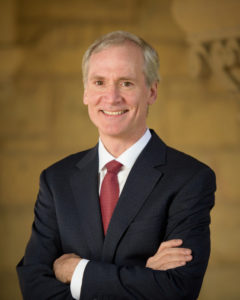
In April 2017, Stanford President Marc Tessier-Lavigne was selected to join the American Philosophical Society (APS). He is one of 32 new members inducted this year.
Founded by Benjamin Franklin in 1743, the APS is the oldest scholarly association in the U.S. The APS actively promotes sciences and humanities through publications, research grants, library and meetings.
Other early leaders of the country, including former U.S. presidents George Washington, John Adams, Thomas Jefferson and James Madison, were among the first members of this organization. During the society’s long history, members have included figures like Thomas Edison, Louis Pasteur and Albert Einstein.
“I am tremendously honored to be elected to such a distinguished society with such a storied history, and with an overarching interest in public service,” Tessier-Lavigne wrote in an email to The Daily.
Tessier-Lavigne said he believes his career and promotion of interdisciplinary communication were reasons for his selection.
“I expect my work in both neuroscience and as Stanford president may have factored in,” he wrote. “As well, I have advocated for the importance of bringing together knowledge from all the disciplines, which I believe is critical to solving the complex problems that impact all of us — a theme that echoes the Society’s mission.”
Other members inducted into the APS this year include former president Barack Obama, Oxford University vice-chancellor Louise Richardson, The New York Times president and chief executive officer Mark Thompson as well as professors from schools such as Princeton University, University of California, Berkeley, Columbia University, Northwestern University and the University of Pennsylvania.
Tessier-Lavigne hopes his membership will help him in his leadership at Stanford.
“I believe that participating in the Society’s activities will be extremely valuable in my role as president, given the importance today of bridging the sciences and humanities,” he wrote. “The Society brings together an esteemed group of colleagues, all engaged in pursuing intellectual inquiry and critical thought in the public interest. I look forward to learning from them.”
Contact Amanda Lee at amanda828 ‘at’ gmail.com.
